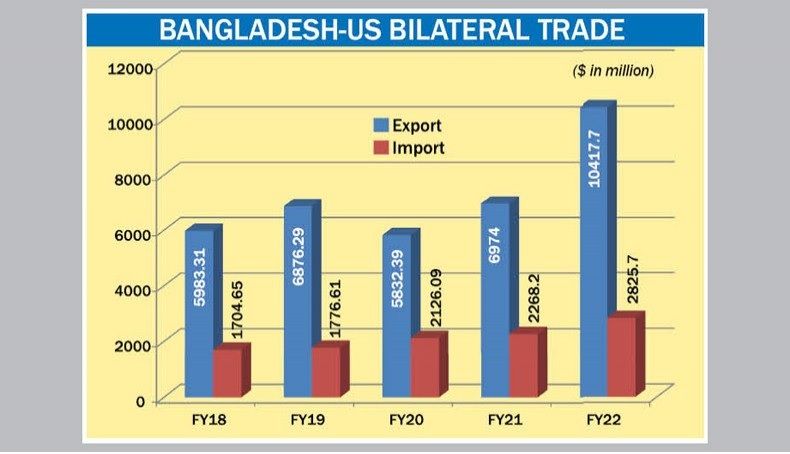While the bilateral trade between Bangladesh and the United States has grown significantly in the past five years in favour of Bangladesh, a decision to stop buying necessary goods from the US may not augur well for Bangladesh, economists said.
Bangladesh’s imports from the US increased by 65.7 per cent in the period between the financial year 2017-18 and 2021-22 while the US imports from Bangladesh grew by 74 per cent in the period.
According to Bangladesh Bank data, the country’s imports from the US in the FY22 stood at $2.82 billion which is 24.58 per cent higher than that of $2.27 billion in FY21.
Bangladesh’s imports from the US in FY18 were $1.7 billion and the figure increased to $1.77 billion in FY19 and $2.12 billion in FY20, the data showed.
Bangladesh mainly imports mineral fuels, mineral oils, scraped irons, oil seeds, including soya bean, cotton, boilers, machinery and mechanical appliances.
Against the imports, Bangladesh’s exports to the US stood at $10.42 billion in the FY22, which were $5.98 billion in FY18, Export Promotion Bureau data showed.
The US is the single largest export destination for Bangladesh and the country mainly exports woven garments, knitwear and leather and leather goods to the US market.
Without mentioning any country’s names, prime minister Sheikh Hasina on Saturday said that Bangladesh would not purchase anything from any country if it imposed sanctions.
‘I will not buy anything from those who will give sanctions,’ she said.
In December 2021, the US Treasury Department sanctioned the Rapid Action Battalion and seven of its officials due to their alleged involvement in significant human rights violations.
However, some economists believe that the government’s decision in question may not prove to be a good one for the Bangladesh’s economy.
‘Stopping imports from the US will not be a well thought-out affair and I think it will not happen,’ Policy Research Institute chairman Zaidi Sattar told New Age on Wednesday.
‘We import goods from the US for meeting our needs; the US is not forcing Bangladesh to import. In the same way, the US is also importing apparel and some other goods from Bangladesh,’ he said.
Businesses import goods from countries which provide quality products at competitive prices, he said.
‘If Bangladesh stops importing from the US, some other destinations, including the European countries, could be the substitute of the US. But it is true we import some high-quality items from the US for meeting our requirements,’ Zaidi Sattar said.
The economist said that it was possible for Bangladesh to import the products from alternative sources, but the products which were imported from the US had undoubtedly a high demand in Bangladesh.
Bangladesh Garment Manufacturers and Exporters Association president Faruque Hassan said that the trade and commerce between Bangladesh and the US had been growing over the years and there should not be imposition of any restrictions which could hamper the interests of consumers of both the countries.
‘I think trade issues will remain separate from the political issues,’ he said.
The US was the sixth largest import source for Bangladesh in FY22 and Bangladesh imported mineral fuels, mineral oils and products worth $791.8 million in the financial year.
The BB data showed that Bangladesh imported iron and steel worth $729.5 million, oil seeds and oleaginous fruits, miscellaneous grains and industrial or medicinal plants worth $435.1 million and cotton worth $290.4 million from the US in FY22.
‘For protecting the interests of the country, we should adopt a policy of not linking economic issues with the political ones,’ economist Ahsan H Mansur said.
If Bangladesh imposes trade restriction on any country, they would also impose a ban on imports from Bangladesh, he said.
Keeping economic issues separate from political issues, Bangladesh should work on solving the non-economic issues, Mansur said.
‘We export products worth $10 billion to the US and import from the US products worth $2.8 billion. We have no leverage. So, any decision should have been taken keeping the national interest in mind,’ the economist said.
‘The trade and investment relationship between Bangladesh and the US is strong now and hopefully the political relations would not put any impacts on economic relations of the two countries,’ American Chamber of Commerce in Bangladesh president Syed Ershad Ahmed said.








